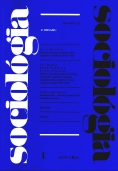Kulturní a sociálně ekonomické zdroje nerovností v šancích na dosažení vysokoškolského vzdělání v České republice v letech 1948-1999
Cultural and Socio-Economic Origins of Unequal Opportunities in Attaining Higher Education in the Czech Republic (1948-1999)
Author(s): Blanka Řeháková, Natálie Simonová, Petr MatějůSubject(s): Social Sciences
Published by: Sociologický ústav - Slovenská akadémia vied
Keywords: Higher education; inequalities; social status; social and cultural capital; social origin
Summary/Abstract: Cultural and Socio-Economic Origins of Unequal Opportunities in Attaining Higher Education in the Czech Republic (1948 – 1999). The article addresses the development of higher education in the Czech Republic after 1989. Czech higher education has changed profoundly since 1989. The most significant structural changes in the Czech tertiary education system addressed in the paper are decentralization and diversification. With an understanding of the basic parameters of both the contemporary political and institutional reforms and those in effect prior to November 1989, the authors address the question of how inequalities in access to tertiary education have evolved in the Czech Republic. Authors have formulated a hypothesis, which claims that the period of stable inequalities in the years 1948-89 was replaced by a period of growing inequalities during the post-communist transformation (1989-1999). The study devotes the most attention to the cultural and socio-economic (class) dimensions of social origin and gender, and their influence on the chances of attaining higher education. The authors consider the comparison of the levels of inequality during the communist era and in the post-communist era to be of particular importance. Theoretically they have drawn on the work of Raftery and Hout (1996) and Hanley and McKeever (1997), who discovered that the chances of attaining higher education among individuals from families with a low social status can only increase on the condition that the demand for the given level of education has first of all been satiated among all the strata disposing of social and cultural capital. Using a loglinear analysis the authors modelled the influence of social origin on the chances of making a successful transition between secondary and tertiary education in the years between 1948 and 1999. The initial hypothesis of the growing influence of social origin on this transition in the period after 1989 was confirmed by the authors in their analysis of data. They see an explanation for this trend in the insufficient degree of expansion of the tertiary sector of education, which is incapable of satisfying the continually growing demand for higher education amidst circumstances in which socio-economic inequalities are on the rise.
Journal: Sociológia - Slovak Sociological Review
- Issue Year: 2004
- Issue No: 1
- Page Range: 31-56
- Page Count: 26
- Language: Czech

